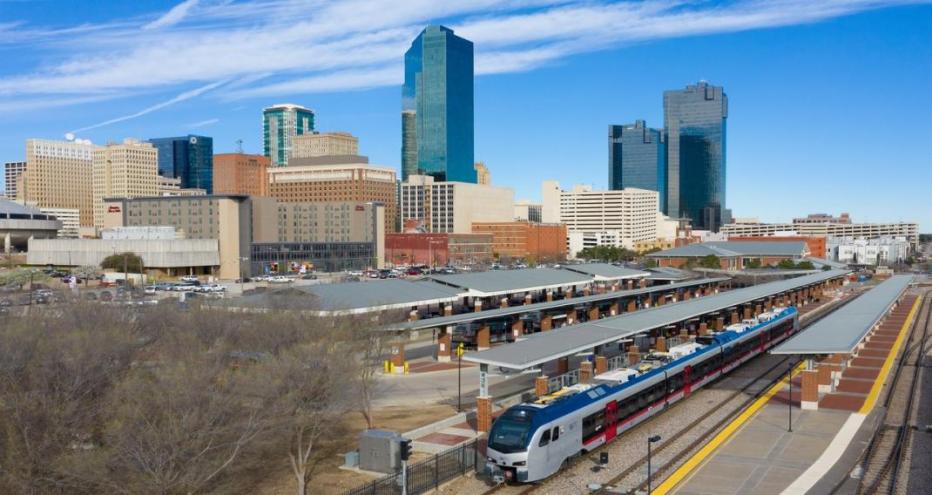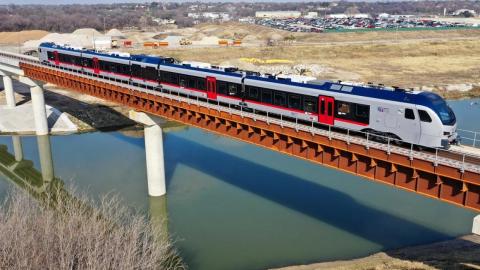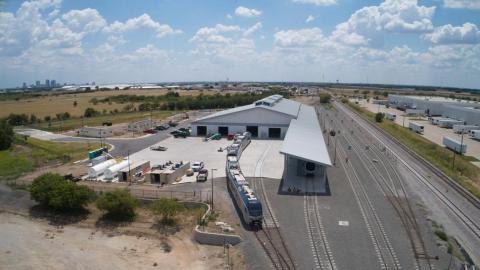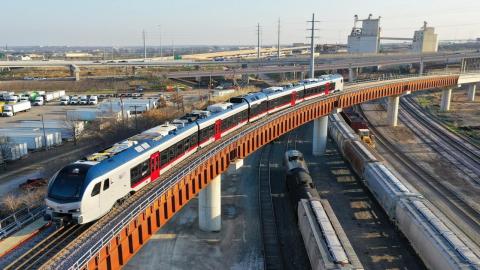
During the past two decades, sustained growth in Dallas and Fort Worth has increased travel demands along the major roadways within the TEXRail corridor.
Existing and committed roadway improvements have not kept pace with traffic volume, resulting in increased congestion and air pollution. TEXRail is one of several transit improvements aiming to address these issues and Jacobs served as program manager for the new TEXRail line, which officially opened in January 2019.
The new commuter rail line crosses 27 miles over nine stops and three cities – from Fort Worth, North Richland Hills and Grapevine to Dallas-Fort Worth (DFW) International Airport. By the end of the first year of operation, Trinity Metro’s new line is expected to serve more than 8,000 daily riders. By 2035, nearly 14,000 riders are projected to ride.
-
27
mile commuter rail system connecting three cities
-
52
minute end-to-end commute
-
488
total capacity per car
-
14 K
daily riders expected by 2035
“Our team is incredibly proud to have been a part of this exciting and critical project that will help Dallas-Fort Worth meet the needs of future travel demands. Not only is this vital rail route connecting travelers with hubs across the region, it’s also providing an important economic and employment benefit to the region, while enhancing mobility, easing congestion and improving air quality along the corridor.”
Confronting population growth and congestion
With this new commuter rail system, the fastest-growing U.S. metro area is more connected and enjoying better mobility, cleaner air and less congestion on roadways.
During the TEXRail’s free trial period in its first 22 days of operation, nearly 100,000 riders hopped aboard. Each TEXRail car holds 229 seats with a total capacity of 488. As an articulated train, it’s easy to walk between cars during the ride – an end-to-end commute of 52 minutes. Car features include USB charging stations, seatback trays, overhead luggage storage and even a designated quiet car. The train also offers level boarding, making it easy for passengers with bikes, strollers, rolling luggage or wheelchairs.
Due to the excitement around the line and its impressive initial ridership, Trinity Metro is already looking into expansion plans. Since the initial 27-mile TEXRail line came in under budget, there’s potential to use the funds for future expansion routes that could serve the Fort Worth Medical District and Texas Christian University.
Jacobs was instrumental in the delivery of the TEXRail project, providing program management consulting services and engineering oversight for the project since 2011. Our full scope of services included:
Our full scope of work on TEXRail encompassed:
- Project controls, including scheduling, cost control, document control and configuration management services.
- Value engineering, risk assessment and cost-estimating.
- Oversight of preliminary engineering and environmental services.
- Development and implementation of a community outreach plan.
- Assistance with negotiations for trackage/access rights with host railroads for construction, operation and maintenance of the corridor.
- Development of a procurement plan and procurement support services for professional, construction and rolling stock services.
- Oversight and quality assurance of final design and construction.
- Development and implementation of system safety and security initiatives.
- Start-up and commissioning services.
In 2019, the Construction Management Association of America awarded the project a Project Achievement Award in the Transportation – Constructed Value Greater Than $100 Million category.















































